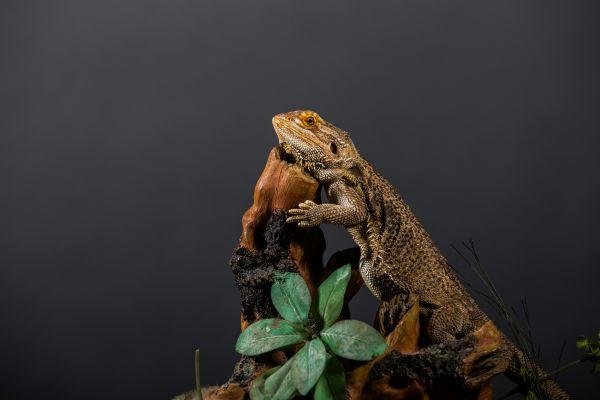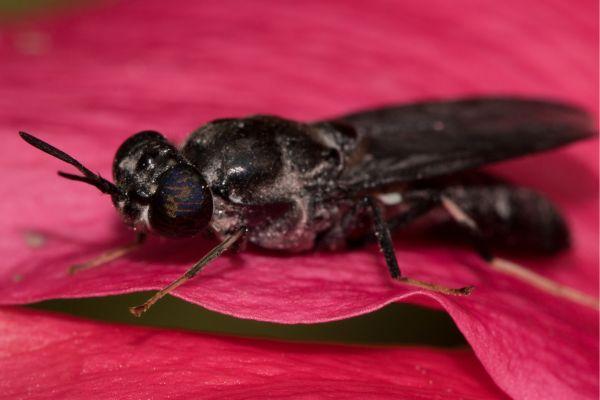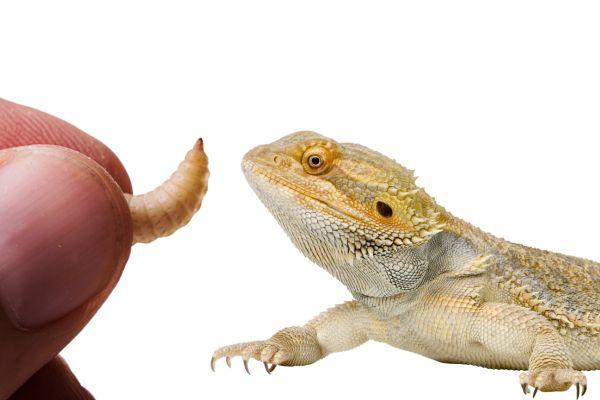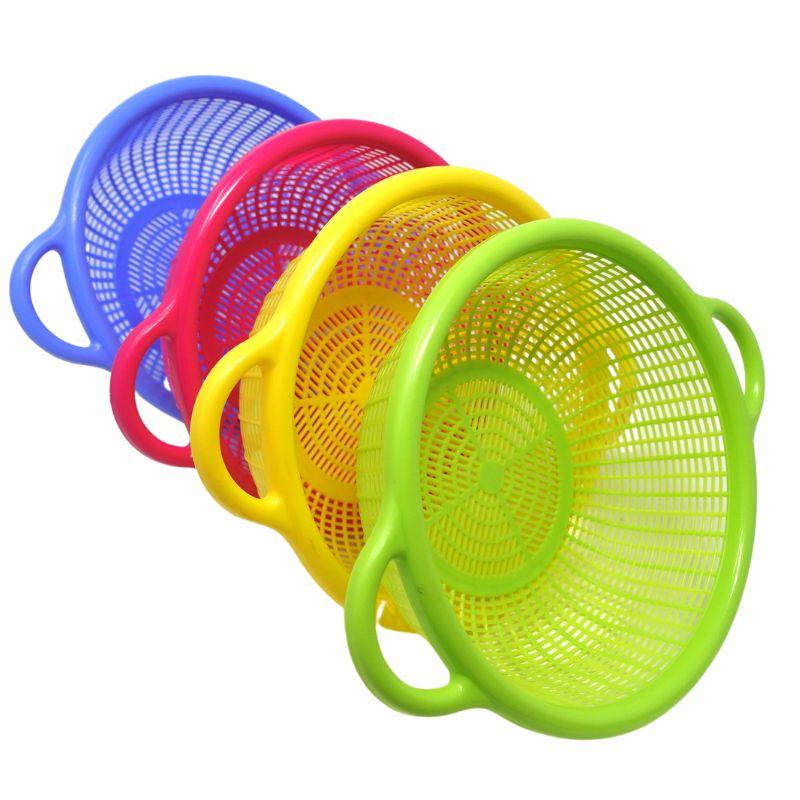How Many Black Soldier Fly Larvae Can You Feed a Bearded Dragon
Posted by Spencer Doepel on
We all know Bearded Dragons are cool and unique pets, but what kind of food do they need to stay healthy?
Black Soldier Fly Larvae have come to light as one of the best feeders for reptiles with a high calcium content and a great source of protein and healthy fats.
Since black soldier fly larvae are so rich in nutrients the question then becomes, how many larvae should you feed your pet Bearded Dragon? It's time to explore the answer in this blog.
Quick Breakdown
The ideal number of larvae to give your bearded dragon depends on its size and age. Generally, you should provide one to three large black soldier fly larvae per day as part of your pet’s balanced diet.
Table of Contents
Why You Should Feed Black Soldier Fly Larvae to Bearded Dragons
How Many Larvae to Feed Your Bearded Dragon?
How to Prepare Black Soldier Fly Larvae for Feeding
What Kind of Nutrition do Black Soldier Flies Provide?
Responses to Common Questions with Detailed Explanations
Why You Should Feed Black Soldier Fly Larvae to Bearded Dragons
When it comes to what type of insects to feed your bearded dragons, black soldier fly larvae should definitely be on the list.
Black soldier fly larvae, or BSFL for short, provide a wide variety of benefits and nutrients that are essential for a bearded dragon’s nutrition and overall health.
They are not only high in calcium and iron, but they can also provide abundant proteins and energy-rich fats, making them an ideal food choice.
Furthermore, BSFL have been shown to improve digestion and boost immunity—something that any beardie owner would want!
However, like with all things, there is a trade-off for feeding BSFL. Black soldier fly larvae have one of the shortest lifespans of all the feeder insects in the reptile hobby. They are prone to drying out and dying since they are used to moist habitats.
After 2-3 weeks the larvae, will turn black and pupate or metamorphose into a small black soldier fly. Some bearded dragons may enjoy the adult flies and eat them. This can be a great source of food and enrichment for your bearded dragon.
All in all, feeding bearded dragons black soldier fly larvae provides many benefits. BSFL alone can provide complete nutrition but it is always recommended to feed a diverse range of foods regularly to make sure your dragon is getting all the vitamins and minerals they need.
Now that we have answered the question of why you would want to feed black soldier fly larvae to your bearded dragon, we can talk about how many BSFL is an appropriate amount to feed a bearded dragon.
How Many Larvae to Feed Your Bearded Dragon?
When it comes to feeding your bearded dragon Black Soldier Fly Larvae, much is based on the size and age of your bearded dragon.
- Baby/Young Bearded Dragons (1-3 Months)- 60 Small Black Soldier Fly Larvae Per Day (420 Small Weekly)
- Juvenile Bearded Dragons (3-6 Months) - 80 Medium Black Soldier Fly Larvae Per Day (560 Medium Weekly)
- Adult Bearded Dragons (6+ Months) - 15 Large Black Soldier Fly Larae Per Day (105 Large Weekly)
Evidence suggests that striking the right balance is critical in making sure bearded dragons get the nutrition they need. In some cases, there are potential benefits associated with supplementing BSF larvae in addition to typical meals like crickets and greens.
Anecdotal evidence also suggests that younger dragons who don't eat enough can benefit from having BSF larvae readily available as part of their diet.
Ultimately, when deciding how many black soldier fly larvae to feed your bearded dragon, the most important factor is the age, weight and overall health of your pet.
You should consult a vet or reptile expert before deciding on the optimal number of larvae for your individual dragon’s age and health status.
With guidance and careful consideration of their individual needs, you'll find the best number for them to stay healthy and happy.
No matter what amount of BSF Larvae you ultimately decide on for your bearded dragon, quantity will play an important role in providing them with a balanced diet.
Depending on whether your bearded dragon is a baby or an adult, the size and amount of food they need can vary greatly. The next section will explore this topic further so you can make informed decisions when it comes to your beardie's diet.
How to Prepare Black Soldier Fly Laves for Feeding
Once you receive your Ecoflys Black Soldier Fly Larvae from the mail. Open the package and put the black soldier fly larvae in a cool place. In the larval stage, 55F can slow down or extend the black soldier fly larvae lifecycle.
Your black soldier flies larvae will be in an 8oz-32oz deli cup with corn cob substrate. This yellow grain substrate helps reduce the smell of the black soldier fly larvae and helps hold moisture in to help extend the black soldier fly larva's life.
The larvae can be kept inside the cup or moved to another bin to gut load and grow larger. When separating the larvae from the corn cob substrate you can use sifters such as the sifters provided below.
With proper preparation and monitoring, BSFL can provide an easily digestible source of protein with all essential amino acids needed by dragons - making them an excellent dietary choice for reptiles alike!
Transitioning into the next section about nutrition offered by black soldier fly larvae, we will take a closer look at how they compare nutritionally compared to other insect options.
What Kind of Nutrition Do Black Soldier Flies Provide?
Black Soldier Fly Larvae (BSFL) are a nutritious food source for many reptiles, including bearded dragons. BSFL serves as an excellent dietary supplement, providing essential nutrients and minerals.
They are high in protein, calcium, and amino acids add a great source of nutrition to the diet.
The high levels of Omega-3 & 6 fatty acids make them a powerful source of energy that helps fuel your bearded dragon’s natural beauty and health.
Many experts argue that feeding BSFL is the best way to ensure your reptiles get all of the essential nutrients necessary for optimal health.
It seems clear that proper nutrition is best achieved through a balanced diet of different types of food sources, each playing its own unique role in proper growth and development alongside providing essential vitamins and minerals to keep your pet healthy and well-nourished over time.
Any diet should include live insects like crickets and waxworms in addition to BSFL to ensure that your beloved pet gets everything it requires from its meals.
Responses to Common Questions with Detailed Explanations
Are black soldier fly larvae a suitable option for feeding my bearded dragon?
Yes, black soldier fly larvae are a suitable option for feeding your bearded dragon. These larvae are high in protein and contain many essential vitamins and minerals that help fuel and maintain the overall health of your dragon.
Additionally, they provide a variety of sizes that make it easy to select the right size feeder relative to the size of your dragon so you can be sure it will receive appropriate nutrition.
What other food items should I include in my bearded dragon's diet besides black soldier fly larvae?
In addition to black soldier fly larvae, there are many other nutritious and essential items that you can include in your bearded dragon's diet. Feeding them a variety of different types of food helps give them the full range of vitamins and minerals they need to stay healthy.
Generally speaking, the best type of food for your bearded dragon is live insects such as crickets, mealworms, waxworms, locusts and earthworms. These should make up most of their diet as they provide important proteins and fats. Additionally, you can also offer some fresh fruits and vegetables like kale, squash, zucchini, banana, mango and raspberries. Gut loaded silkworms and super worms are also packed with nutritional benefits for your beardie! To ensure that your bearded dragon receives all needed vitamins and minerals, it’s recommended to dust their food with a reptile vitamin powder supplement from time to time.
What are the benefits of feeding my bearded dragon black soldier fly larvae?
Black soldier fly larvae (BSFL) are a great food option for many insect and reptile species, including bearded dragons. Feeding your bearded dragon black soldier fly larvae can provide numerous benefits, such as:
1. Nutritionally Dense - BSFL are an excellent source of protein, fat and essential vitamins and minerals that help keep your bearded dragon healthy. They have high levels of calcium, phosphorus and magnesium, which are all vital nutrients for reptiles.
2. Improved Digestion - The soft exoskeletons of the BSFL make them easy to digest, reducing the risk of impaction associated with harder-bodied insects like crickets or mealworms. This can be especially beneficial for younger dragons or those who have digestive issues due to illness or parasite infection.
3. Variety - Feeding your Beardie a variety of different insects is always recommended to ensure proper nutrition and reduce boredom in their diet. Offering them the occasional BSFL can add some welcome variety and excitement to their eating routine.
Overall, feeding your bearded dragon black soldier fly larvae can provide numerous nutritional and digestive benefits while adding some interesting variety to their diet.




